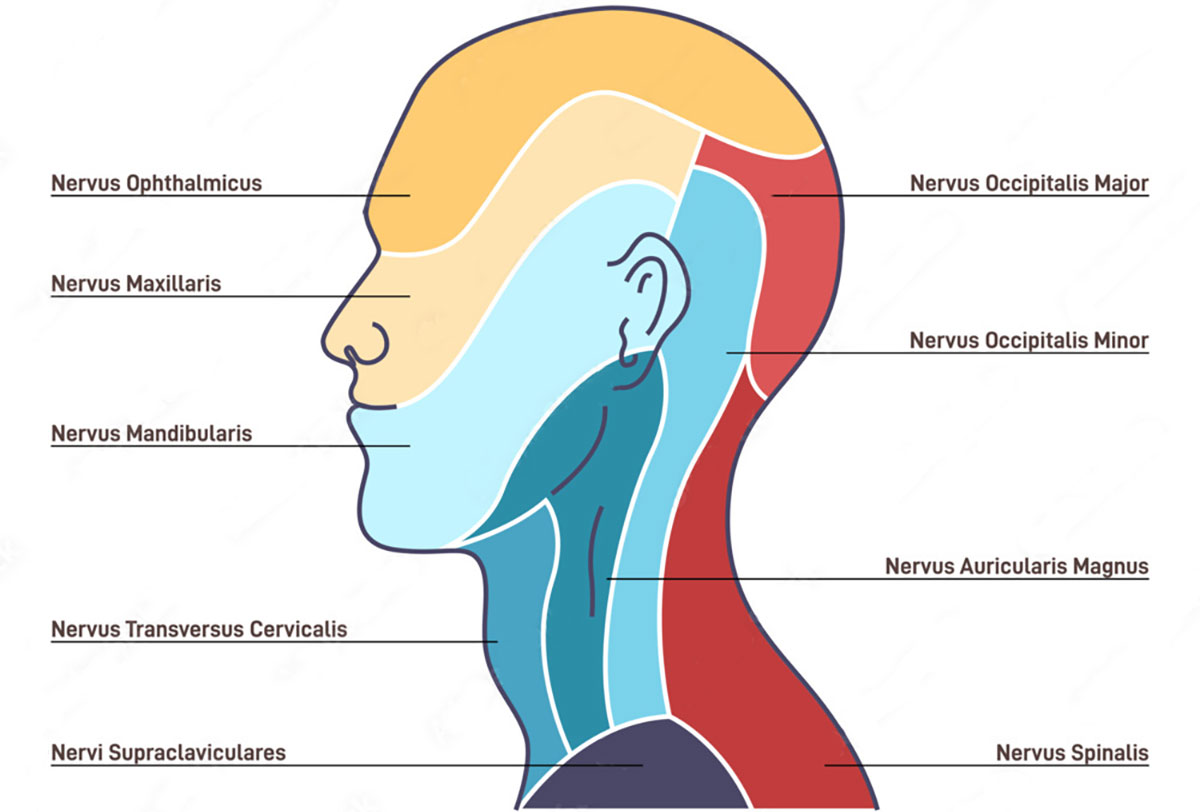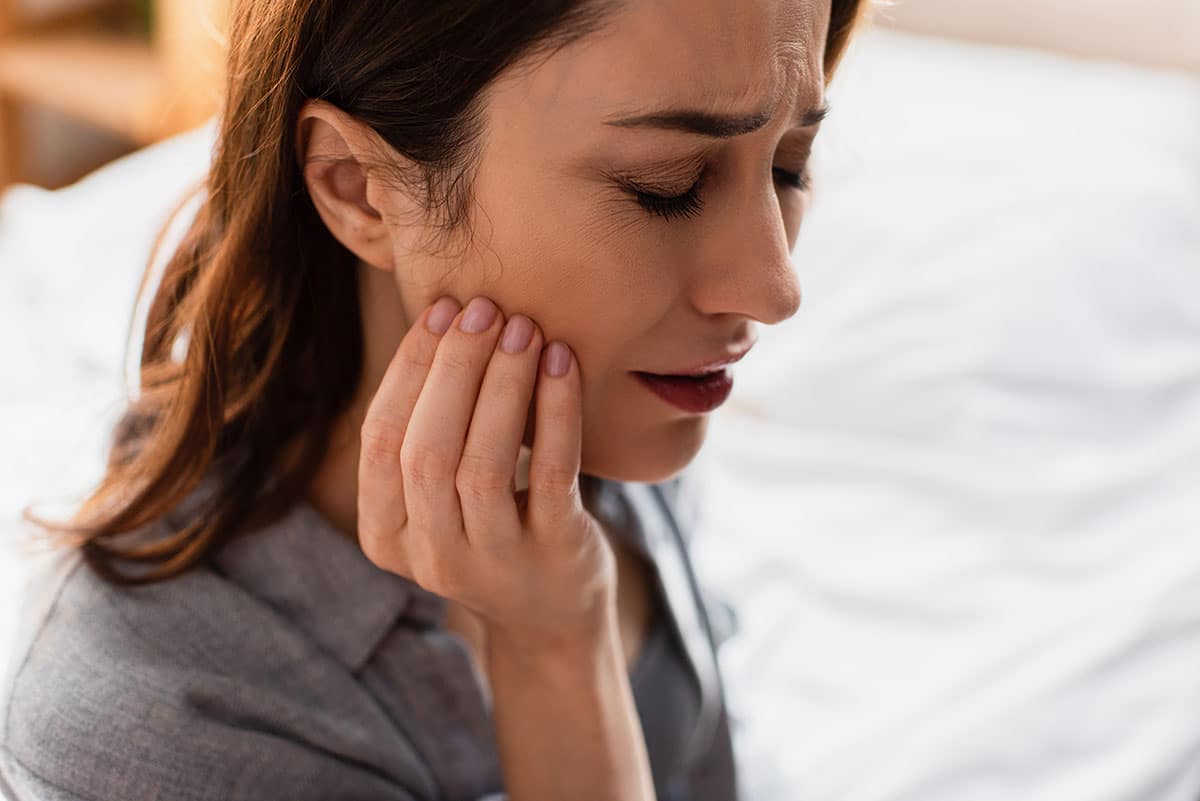Many people suffer from chronic headaches or migraines without realizing that their oral health could be a contributing factor. Can dental issues cause migraines? Yes, so if you frequently experience unexplained headache pain, your dentist may be able to help identify the root cause. Dental issues such as misaligned teeth, bruxism (teeth grinding), temporomandibular joint (TMJ) disorders, and even cavities can trigger tension headaches and migraines. Addressing these concerns can help alleviate discomfort and improve your quality of life. Let’s discuss further.
Table of Contents
The Link Between Dental Problems and Headaches

The connection between dental problems and headaches is largely due to the intricate network of nerves that link the jaw to the head. One of the most significant nerves involved is the trigeminal nerve, which is responsible for sensation in the face and motor functions such as biting and chewing. The trigeminal nerve branches into three main divisions: the ophthalmic (V1), maxillary (V2), and mandibular (V3) nerves. The mandibular branch is directly connected to the jaw and temporomandibular joint (TMJ), making it a key player in dental-related headaches.
When the TMJ or surrounding muscles experience stress, inflammation, or misalignment, the trigeminal nerve can become irritated, leading to pain signals that radiate to the temples, forehead, and even behind the eyes. Additionally, excessive clenching or grinding of teeth can overstimulate the nerve, triggering tension headaches or migraines. The close relationship between the trigeminal nerve and the surrounding structures means that dental infections, misalignment, or jaw tension can cause pain to be referred to other parts of the head.
Moreover, other nerves such as the facial nerve (cranial nerve VII) and glossopharyngeal nerve (cranial nerve IX), which also pass through or near the jaw, can contribute to headaches when affected by dental issues. These nerves work in conjunction with the trigeminal nerve, meaning that any dysfunction in the jaw or oral cavity can have widespread effects, often manifesting as persistent headaches.
Can Dental Issues Cause Migraines and Headaches?
The human body is interconnected, and oral health plays a crucial role in overall well-being. Dental problems can cause headaches in several ways. The nerves and muscles of the face, jaw, and head are intricately connected, meaning that strain or pain in the oral region can radiate upwards, leading to tension headaches or even severe migraines. Jaw misalignment, clenching, or inflammation from infections can result in muscle fatigue, nerve irritation, and restricted blood flow, all of which contribute to chronic headaches. Furthermore, when the body attempts to compensate for bite issues or grinding habits, it can create additional strain on surrounding muscles, worsening headache symptoms.
For example, when a person has an improper bite, their jaw muscles may work harder to bring the teeth into proper alignment during chewing. This excessive strain can cause the muscles to tighten and spasm, leading to pain that extends to the temples and forehead. Similarly, those who grind their teeth at night may experience muscle tension that extends through the jaw and into the head, causing them to wake up with persistent headaches. Even something as simple as untreated cavities can lead to referred pain, where pain from an affected tooth is felt in another area, such as the head or neck.
What Dental Problems Can Cause Headaches?

While headaches can stem from various sources, some dental issues are often overlooked as potential causes. As we’ve learned, the oral and cranial structures share nerve pathways and muscle connections, meaning imbalances or dysfunctions in the mouth can contribute to persistent headaches. Identifying these dental-related causes is crucial for those who experience chronic head pain and have not found relief from traditional headache treatments. By recognizing the role of dental health in headache symptoms, patients can seek targeted solutions that address the root of the problem rather than just the symptoms.
Several dental conditions can lead to chronic headaches, including:
TMJ Disorders
The temporomandibular joint connects the jaw to the skull. If misaligned, inflamed, or overused, it can cause jaw pain, tension, and headaches radiating to the temples and forehead. Many patients with TMJ disorders also experience ear pain or a sensation of fullness in the ears, which can further contribute to discomfort. For example, someone who frequently chews gum or clenches their jaw due to stress may unknowingly exacerbate TMJ symptoms.
Bruxism (Teeth Grinding & Clenching)
Grinding your teeth, often unconsciously at night, puts excessive strain on the jaw muscles, leading to tension headaches, jaw pain, and worn-down teeth. This condition is commonly linked to stress and anxiety and, in severe cases, can cause enamel erosion and tooth fractures. Many people do not realize they grind their teeth until they wake up with a sore jaw or their dentist notices excessive wear on their teeth.
Malocclusion (Bite Issues)
If your teeth are not correctly aligned, your jaw muscles may overcompensate, leading to muscle strain, facial pain, and headaches. This is especially true for individuals with crossbites, overbites, or underbites. For example, someone with a misaligned bite may find it difficult to chew food evenly, causing uneven strain on one side of the jaw and leading to persistent headaches.
Cavities and Infections
Untreated cavities or infections can cause referred pain, which may manifest as headaches or even mimic migraine symptoms. A deep cavity that reaches the tooth’s nerve can cause significant pain radiating to the head and neck. Similarly, an abscessed tooth can lead to swelling, fever, and throbbing headaches if left untreated.
Impacted Wisdom Teeth
Wisdom teeth that are not correctly erupted or are impacted can cause significant pressure on surrounding tissues, resulting in headaches and jaw discomfort. For instance, a patient with partially erupted wisdom teeth may experience constant pain at the back of the jaw, leading to tension headaches that persist throughout the day.
Tight Jaw Muscles
Chronic muscle tension in the jaw, often caused by stress, excessive chewing, or prolonged clenching, can lead to persistent headaches. When the muscles in the jaw become overworked, they can radiate pain to the temples, forehead, and neck. This type of headache is often exacerbated by activities such as chewing tough foods, prolonged talking, or maintaining poor posture. Over time, untreated muscle tightness can contribute to TMJ disorders and chronic tension headaches.
Signs & Symptoms to Watch For
If you frequently experience headaches and suspect a dental cause, look out for these additional symptoms:
- Jaw pain or clicking sounds when opening or closing your mouth
- Tooth sensitivity or aching teeth, especially when chewing
- Pain in the temples, around the ears, or radiating to the neck and shoulders
- Difficulty chewing or biting due to discomfort
- Frequent teeth grinding (often noticed by a partner or evidenced by worn-down teeth)
- Stiffness in the jaw upon waking up, which may indicate nocturnal bruxism
- Facial swelling or tenderness, which could indicate an infection or dental abscess
Dental Procedures That Can Help

If headaches caused by dental issues are left untreated, they can lead to chronic pain and discomfort. Fortunately, there are several effective treatments available that can target the underlying causes of these headaches. Your dentist will first conduct a thorough evaluation, including dental X-rays, bite analysis, and muscle assessments, to determine the most appropriate course of action. Treatment options range from preventative care and lifestyle modifications to advanced dental procedures that provide long-term relief. Here are some solutions that can help alleviate dental-related headaches:
Your dentist can thoroughly examine and recommend treatments tailored to your specific condition. Some effective dental solutions include:
- Mouthguards for Bruxism – Custom-fitted nightguards can prevent teeth grinding and alleviate pressure on the jaw muscles. These appliances cushion between the teeth, reducing strain and preventing further wear. Patients who use mouthguards often notice a significant reduction in morning headaches and jaw pain. Another Bruxism treatment is Botox injections, but these will have to be carefully monitored by your dental professional.
- TMJ Therapy – Treatments such as bite adjustments, orthodontic solutions, or even Botox injections can help relieve TMJ-related pain. Botox can temporarily relax overactive jaw muscles, reducing headaches and preventing involuntary clenching. A TMJ massage can also help temporarily relax tight jaw muscles and reduce headache symptoms.
- Bite Correction – Orthodontic treatments, such as braces, Invisalign, or occlusal adjustments, can realign the teeth and reduce strain on the jaw. A well-aligned bite ensures that chewing forces are distributed evenly, reducing unnecessary pressure on the jaw muscles.
- Dental Fillings & Root Canals – Treating cavities and infections can eliminate pain contributing to headaches. If a tooth infection is severe, a root canal may be necessary to remove the infected tissue and relieve pressure in the surrounding area.
- Wisdom Tooth Removal – If impacted wisdom teeth are causing discomfort, extraction can relieve pressure and prevent further complications. Many patients report significantly improving headache frequency and intensity after having their problematic wisdom teeth removed.
How Your Dentist Can Help
At Martindale Dental, we take a holistic approach to oral health. If you are struggling with persistent headaches or migraines, our team will conduct a comprehensive assessment to determine if a dental issue may be the underlying cause. Using advanced diagnostic tools, we can identify signs of bruxism, TMJ dysfunction, malocclusion, or infections contributing to your discomfort.
Addressing oral health concerns early can help you achieve a healthier smile and a pain-free life. Our customized treatment plans aim to provide lasting relief and improve overall well-being.
If you are experiencing frequent headaches and suspect a dental connection, don’t wait to seek professional care. Contact Martindale Dental today to schedule a consultation and take the first step toward lasting relief!
Check us out on Facebook and Twitter for daily information about Oral Health from Martindale Dental, or visit our offices in Hamilton and St. Catharines.
Have more questions?
Please contact us for all inquiries or to book an appointment with one of our convenient clinic locations. We look forward to hearing from you.




